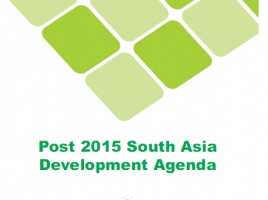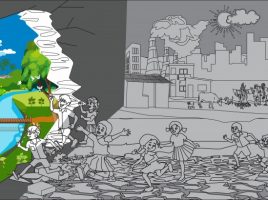Open Dialogue for Solidarity
Note: This photograph have been taken previous to the onset of the pandemic
“Aao faisala karte aaj hi, kya bhed hai aur kya nahi; poochein ye sabko abhi, ek hi toh hai zindagi”
– Pooja Khushwaha (‘Kya Galat Kya Sahi’)
A group of young girls are sitting in a circle in a well-lit room somewhere in Mirzapur city, discussing their dreams and aspirations with sparkle in their eyes. One amongst them, Pooja, aspires to be a writer. Actually, a few like Pooja have (re)discovered their love for writing, and are dabbling in poetry, prose and opinion pieces on social issues. Local publications like Jansatta and Aj Hindi Daily are encouraging their interests and talents and have carried a few of their pieces. You can read Pooja’s article on the rise of domestic violence where she engages with data from the National Commission for Women highlighting a 47% increase during the lockdown. Or the disconnect Sadiya highlights between the University Grants Commission and University of Allahabad’s policies on the current and graduating batch of university students. While writing unleashes their creative potential, the girls aspire for more; for greater freedom to take decisions to fulfil their dreams and define their destiny themselves.
Bars that cage dreams
For women in India, the inability to discover or reach aspirations is not a situational roadblock but reflects the more systemic barriers that prevent them from defining or reaching their goals in a deeply patriarchal society. These issues are amplified within rural and marginalised communities, as evident in the rising levels of unemployment of women. In rural areas, the joblessness of women doubled from 1.7% in 2011-12 to 3.8% in 2017-18[1] – a trend compounded after COVID-19. According to the Centre for Monitoring Indian Economy (CMIE), 8.8mn women lost jobs in 2018, of which 6.5mn were in rural India. Compared to the corresponding national average, the labour force participation rate of women[2], both in rural and urban areas of Uttar Pradesh (UP), were lower by 9 and 7 percentage points respectively.
Women in rural spaces too have dreams and aspirations. Yet, they are prevented from believing in their dreams due to their economic conditions. They are forced into jobs that they didn’t choose; and rendered jobless the second an economy is subjected to a shock. Their ability to choose (‘agency’) is further restricted due to the lack of resources or opportunities. As per a study by LIRNEAsia, in India, only 43% of women own mobile phones compared to almost 80% of Indian males. This gap further widens to 52% in rural areas. In a world that is hyper-connected with information – available at the touch of a button for most of us, and even rural men, women still lag in access. How do we expect them to define their aspirations – let alone reach them – if they are systemically prevented from a basic right like information?
Navigating through ambiguity
“What is the point of dreaming, when we know we won’t reach anywhere?”, asked Sulekha of Jhansi. Work 4 Progress (W4P) program has been navigating such questions through deep listening and open dialogue, with young women and their communities in rural Uttar Pradesh. In the process, we have uncovered ambiguous barriers that prevent their participation in economic activities and understood the potential of entrepreneurship in realising their aspirations.
Making entrepreneurship a viable choice calls for more innovation, tools and platforms to overcome socio-cultural barriers faced by women such as lack of mobility, poor connectivity, and aversion to risk. These restrictions further reinforce the deep-rooted regressive gender roles and patriarchal norms. In rapidly changing economic conditions, conversations with the community reveal the need to channelise efforts to identify and grow opportunities within ICT enabled new economic models. Innovation in technology, enabled by increasing internet connectivity, has shown tremendous potential to bring simple yet transformative solutions to underserved populations. For e.g., Pragya Devi has turned her passion for motorbike riding into an award winning e-rickshaw enterprise in Mirzapur. Her enterprise provides safe transport for young girls while challenging patriarchal norms associated with driving in her community.
Ikigai through open dialogue
To drive inclusion and innovation in livelihood opportunities for women and enable a cultural shift in their engagement with economic opportunities through entrepreneurship, Development Alternatives (DA) initiated the Work 4 Progress Technology Challenge in 2019. Servelots-Janastu (henceforth Janastu) and Medha Learning Foundation emerged as the challenge winners for their technology expertise and innovative implementation approach to create virtual co-working spaces for young women in Eastern UP.
The two organisations subsequently combined their vision and co-created processes to design a virtual platform where women between the ages of 18-25 years can learn and share ideas, skills and talent within a network. With the help of an electronic device called ‘Webinar Pi’, audio-visual communication from groups of young women in different villages are now being recorded, synchronised, annotated and shared among themselves and their communities. It is envisioned that the process of sharing will initiate peer discussions that can enable the young girls to overcome challenges to join the mainstream economy.
In order to develop and deploy such a tool, the team has adopted a ‘modified Ikigai’ – an exercise based on the Japanese concept to find purpose in life. The three kinds of sessions: Meri Pehchaan (my identity), Mere Sapne (my dreams) and Mera Gameplan (my plan) enable them to discover what they were good at and what they loved doing. In the nine dialogue sessions (both physical and virtual) since February 2020, young girls have often expressed their need and desire to be articulate in their communication. The listening sessions reveal that the girls hope to develop abilities in three key areas: being able to pitch their “hunar” (skills) while clearly positioning their strengths; working on their strengths without being limited by societal expectations or the assumptions attached with being a girl; and “knowing the computer” to teach, write and help their families and communities with technology and digitally enabled work.
Capturing the sound of unison
Deep listening during such sessions has helped the team modify their approach and the technology in real-time. Initially, the modules aimed to help the girls develop an entrepreneurial outlook were solely focused on finance and marketing. However, after these listening sessions, the activities were redesigned to focus on aspirational needs like computing, communicating in English, and basic market demand assessments. This adaptive approach helped evolve the planned co-creation activities. For instance, when girls expressed an interest in computer related jobs, an exposure session was conducted to discuss the basics of internet, smartphones and computing.
These listening sessions were also crucial to tailor the technology to local needs. Since infrastructure in villages was not suitable to physically install an internet exchange, the team developed a cloud-based data sharing approach. When the groups of girls spoke in unison during discussions, the team realised that a single camera was not the ideal technology to capture videos. A motion camera with large focal length was installed, which now attempts to capture the richness of the conversations among the women.
Windows that liberate dreams
The Technology Challenge was launched with a vision to deploy technology to help women “walk into a world beyond their village” – says Shrashtant Patara, Senior Vice President – Development Alternatives – who also leads this. Since it was launched, co-created and now tested on ground, the early sparks of realisation of the vision are becoming visible – young women like Pooja and Sadiya are beginning to take small steps outside their villages. New narratives are being encouraged for young women around career trajectories through the technology driven solidarity platforms that can build agency and achieve economic empowerment. Such conversations are enabling DA to navigate multiple realities of the lives of young women to discover their hidden voices as individuals and as a community. Unearthing of these narratives through deep listening, however, is a continuous process; discoveries that will only grow as listening processes are accentuated with the use of technology.
The intervention of the challenge does not seek to use the newest technology in the market to ‘tap’ entrepreneurial energies. Instead, it facilitates a deepening of inner strength and social cohesion in communities with a focus on dialogue through empathy. For our collective vision of creating a grassroots movement rooted in equity and sensitivity, it will be essential to create spaces that are “safe” and “welcoming” enough for unrestricted dialogue among women. Technology can be disruptive but through listening it can also support the spread of empathy and solidarity. It can enable many like Pooja to self-actualise their potential and create the change they wish to see.
Inspired by the initial success of the technology challenge, DA is now delving deeper into discovering these hidden narratives by developing build a global listening platform for the youth – Positive Sparks
[1] As per 68th Round of National Sample Survey Organisation (NSSO) survey
[2] Annual Employment-Unemployment Survey (EUS), 2015
Saubhagya Raizada
sraizada@devalt.org
The views expressed in the article are those of the author’s and not necessarily those of Development Alternatives.
This blog first appeared as an editorial in Development Alternatives Newsletter September, 2020






Leave a Reply